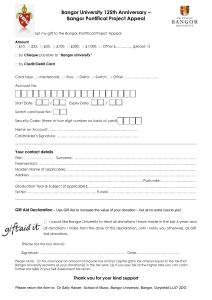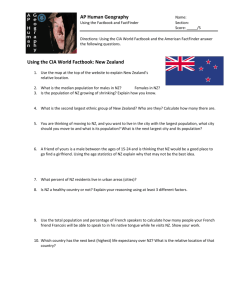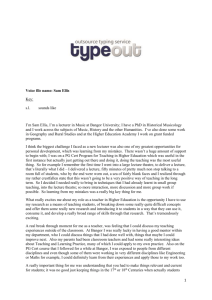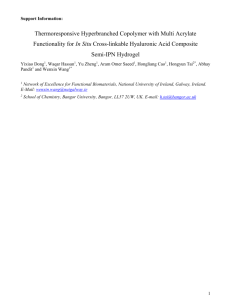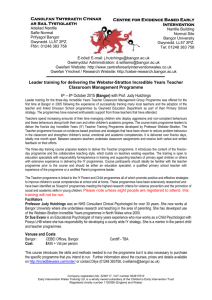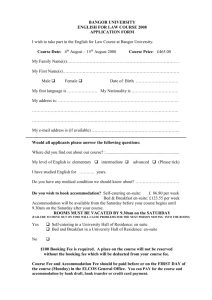top tips for settling into university life
advertisement
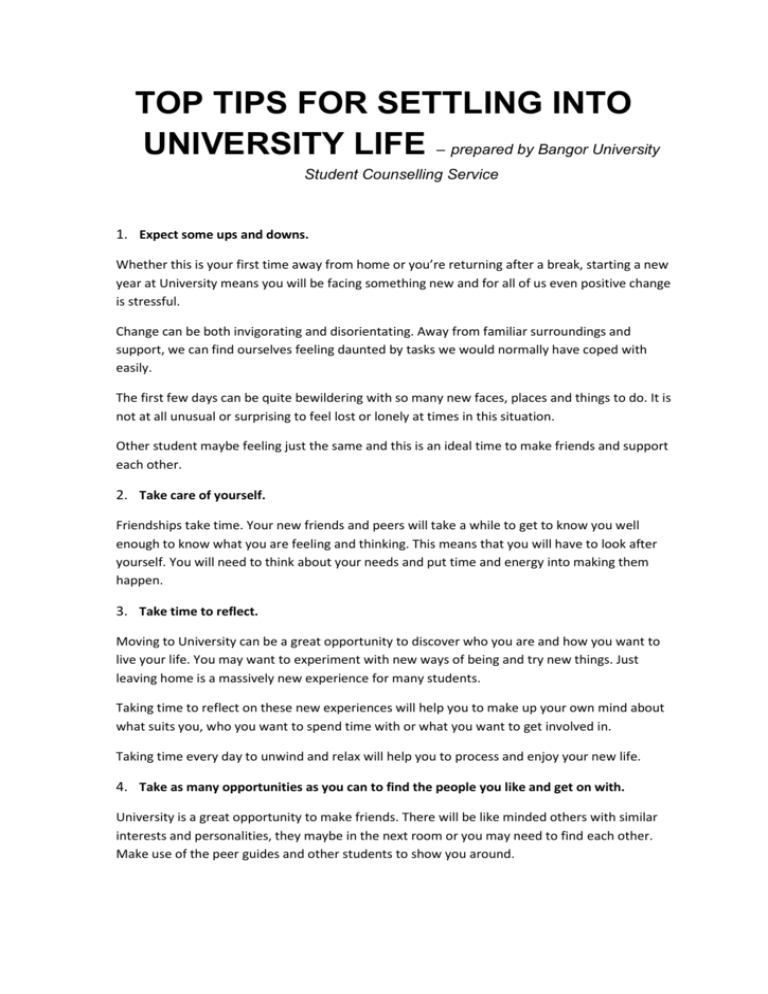
TOP TIPS FOR SETTLING INTO UNIVERSITY LIFE – prepared by Bangor University Student Counselling Service 1. Expect some ups and downs. Whether this is your first time away from home or you’re returning after a break, starting a new year at University means you will be facing something new and for all of us even positive change is stressful. Change can be both invigorating and disorientating. Away from familiar surroundings and support, we can find ourselves feeling daunted by tasks we would normally have coped with easily. The first few days can be quite bewildering with so many new faces, places and things to do. It is not at all unusual or surprising to feel lost or lonely at times in this situation. Other student maybe feeling just the same and this is an ideal time to make friends and support each other. 2. Take care of yourself. Friendships take time. Your new friends and peers will take a while to get to know you well enough to know what you are feeling and thinking. This means that you will have to look after yourself. You will need to think about your needs and put time and energy into making them happen. 3. Take time to reflect. Moving to University can be a great opportunity to discover who you are and how you want to live your life. You may want to experiment with new ways of being and try new things. Just leaving home is a massively new experience for many students. Taking time to reflect on these new experiences will help you to make up your own mind about what suits you, who you want to spend time with or what you want to get involved in. Taking time every day to unwind and relax will help you to process and enjoy your new life. 4. Take as many opportunities as you can to find the people you like and get on with. University is a great opportunity to make friends. There will be like minded others with similar interests and personalities, they maybe in the next room or you may need to find each other. Make use of the peer guides and other students to show you around. Joining societies and attending socials are a great way of meeting others. Do the things you know you will enjoy, take a chance for something new and say no if you feel pressured into anything you’re not comfortable with. 5. Get organised from the start. Life at University offers you a great deal of freedom which requires you to be self motivating and organised. You will need to think about how to divide up your time and find a personal balance that suits you and gives you time to work, play, socialise and be alone. Creating a routine and structure to your day / week is likely to be helpful. 6. Remember to work. Keeping up to date with your work will prevent you getting a backlog and the stress that creates. Remember that problems tend to grow, so take courage and tackle them as soon as they arise. 7. Remember to play. University is a great place to socialise, have fun and follow your hobbies or sporting activities. Make the time to play and relax, it will help you to stay healthy and more productive in your work. 8. Care for your body as well as your mind. Regular exercise, good quality sleep and healthy food will help you to get the very best from University. If at first you have trouble getting organised for cooking, eat at the places provided. Try to avoid just having snacks. You may find that there are other people in your hall to cook with and that might help get you started. (There are also some healthy recipes on the Wellbeing website www.bangor.ac.uk/studentservices/wellbeing) 9. Don’t give yourself a hard time. Not everyone finds it easy to socialise and we all say or do things occasionally that we later regret. Remember beating yourself up achieves nothing. Try to learn whatever lesson is there for you, then forget about it and move on! 10. Don’t do ANYTHING you don’t feel comfortable doing. Whether it is spending more money than you can afford, using drugs, having sex or even just going out when you want an early night. Remember, you do not have to do anything if you don’t want to. 11. Share your concerns…you won’t be alone. Bottling up problems is never helpful. Talk to someone: a friend, family member, peer guides, one of the student support teams or contact the counselling service on counselling@bangor.ac.uk .



